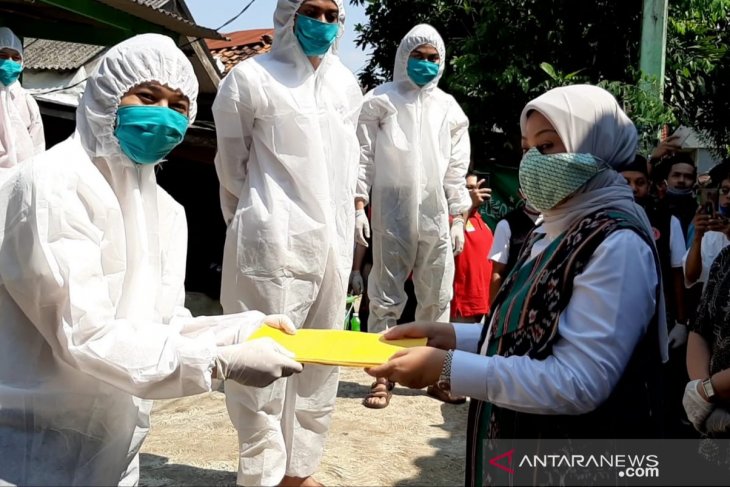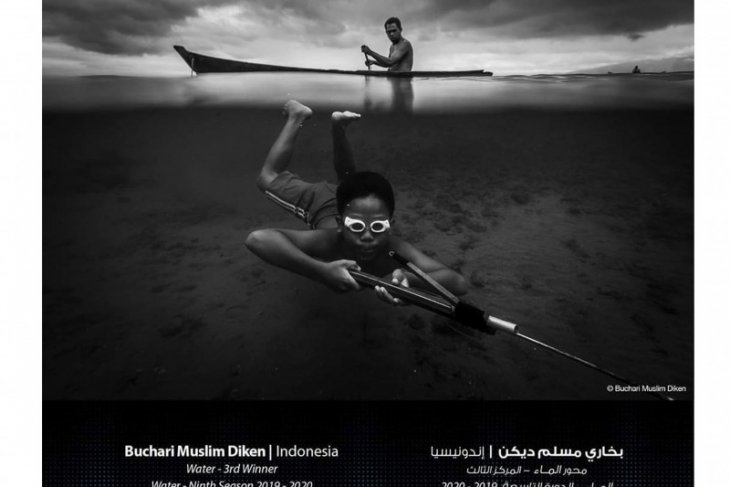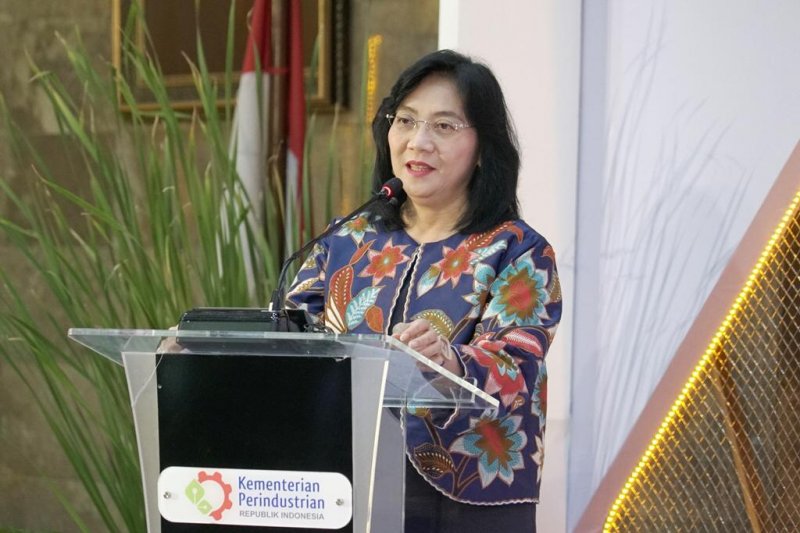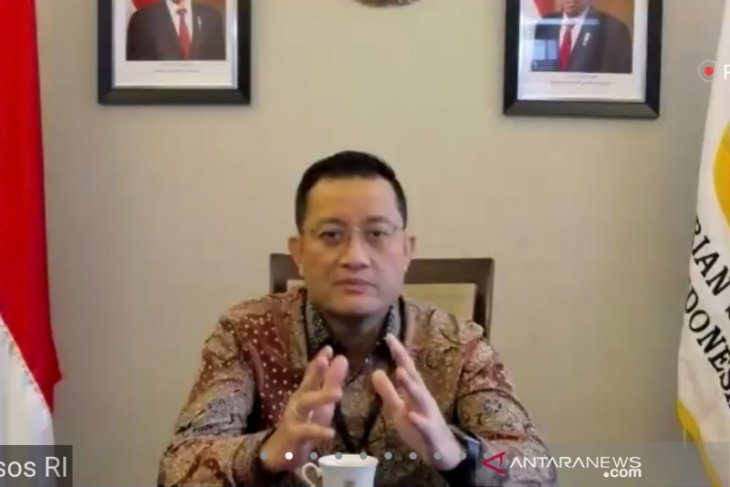Live Streaming
Program Highlight
Company Profile

Ani Hasanah
June
 Manpower Minister Ida Fauziyah symbolically hands assistance to laid-off workers, who were hired to spray disinfectants, in Jakarta on Friday (June 12, 2020). (ANTARA/Prisca Triferna/ac)
Manpower Minister Ida Fauziyah symbolically hands assistance to laid-off workers, who were hired to spray disinfectants, in Jakarta on Friday (June 12, 2020). (ANTARA/Prisca Triferna/ac)
The Manpower Minister has said her ministry will supervise the implementation of the new normal in the world of work, and companies will likely face sanctions if they fail to enforce health protocols.
"The Ministry of Manpower will provide guidance and supervision. The first (priority) is certainly to provide guidance," said Manpower Minister Ida Fauziyah, after leading a disinfection drive in Mampang Prapatan, South Jakarta, on Friday.
To ensure that business operations are carried out in accordance with the health protocol, the COVID-19 Occupational Safety and Health Command Post, set up at the beginning of the pandemic, would provide consultation services, which would be mostly available online, the minister informed. However, if required, officers from the Ministry of Manpower would come down directly to the workplace, she added.
The minister underlined administrative sanctions would be imposed if there is evidence of health code violations in the new normal.
"What we are prioritizing is providing guidance on how companies can continue to run their business, while remaining productive, (and) at the same time, making sure that the health of their workers is protected," she said.
The Ministry of Manpower, she stressed, will initially supervise the process via online modes, and if further steps are needed, then, it will send officers to the concerned locations.
Minister Fauziyah said it would be ensured that though the initial supervision is conducted online, it does not reduce the quality of the supervision itself.
Earlier, Circular Letter Number M / 7 / AS.02.02 / V / 2020 was issued by the Manpower Minister on the Business Continuity Plan in Dealing with COVID-19 Pandemic and Prevention Protocol of COVID-19 Transmission in the Company to provide protection to workers and ensure business continuity.
The letter stated that entrepreneurs would be expected to recognize business priorities, identify pandemic risks, plan risk mitigation, identify pandemic impact responses, design and implement business continuity plans, communicate business continuity plans, and conduct business continuity planning tests.
In addition, the letter dated May 20, 2020 also emphasized the need for the application of health protocols in the workplace to prevent COVID-19 transmission. (ANTARA)
June

A photograph of a man and his son spearfishing, captured by Buchari Muslim Diken, an Indonesian police officer from Maluku Province, won third prize at the Hamdan bin Mohammed bin Rashid Al Maktoum International Photography Awards (HIPA) this year. The theme for the ninth edition of the awards was ‘water'. (Documentation of HIPA/gtm)
A police officer from Maluku Province, Buchari Muslim Diken, has bagged the third place in the ninth edition of the Hamdan bin Mohammed bin Rashid Al Maktoum International Photography Awards (HIPA).
The theme for the annual competition this year was “water”.
Diken, a second police inspector and a freelance photographer, submitted a black-and-white picture of a fisherman and his son spearing coral reef fish, off Negeri Liang waters, Ambon Island, Maluku Province, for the contest.
Diken said he had to dive underwater to take the award-winning shot, which took him three hours to capture. Diken said he snapped at least 100 photographs of the fisherman and his son, and chose the spearfishing picture of the young boy as it strongly reflects Maluku's traditional fishing techniques.
"Beta (Maluku's language for I) submitted the picture for the HIPA contest because this kind of local genius has become rare in our modern world. But, fishermen in Maluku, especially in Ambon Island, still catch fish in this old way," Diken said, referring to the tradition of using a spear to catch fish.
Diken, 32, has won several local and national photography competitions in the past. "I started submitting my works for the HIPA contest in 2015, and in 2017, a single picture of mine made it to the final. But, this year, I took third place in the contest's main category," he stated.
Founded in 2011, HIPA is an international photography award, initiated with the support of the crown prince of Dubai, Sheikh Hamdan bin Rashid bin Mohammed al Maktoum. Offering US$400,000 in prize money, HIPA claims to be the largest prize among photography awards.
As the third-prize winner, Diken will receive a bonus of US$12,000 (around Rp168 million). He said he plans to use the cash to take his parents to Mecca, one of Islam's holiest cities in Saudi Arabia, for a Umrah pilgrimage. "It's a promise to my mother and father," he remarked.
For Diken, being recognized by one of the world's leading photography contests is more important than the prize. "Winning this prestigious competition is the dream of each and every photographer in Indonesia," Diken noted.
"I was shocked and surprised (on winning third place). I never expected my work would win at the contest. My wife, my child, and I spontaneously prostrated on the floor, offering our gratitude to the Lord Almighty Allah SWT," he added.
At this year’s HIPA contest, François Bogaerts from Belgium took the first prize, followed by Shantha Kumar Shivam Laila from India. Meanwhile, Australian photographer Jasmine Carey won the grand prize of US$120,000, "while Emirati creativity sparkled with a two-way victory through photographers Yousef bin Shakar Al Zaabi and Rashed Al Sumaiti," HIPA announced in a statement. (ANTARA)
June
 Director General of Small, Medium and Various Industry, Gati Wibawaningsih (ANTARA)
Director General of Small, Medium and Various Industry, Gati Wibawaningsih (ANTARA)
The Indonesian Industry Ministry plans to impose safeguard measures to protect the national garment industry by preventing low-priced, imported products from flooding the markets.
"The Industry Ministry would provide protection through the imposition of safeguard measures for the garment industry. We have suggested this safeguard action on the basis that imports in the sector have increased during the past three years," the ministry's director general of Small, Medium and Various Industry, Gati Wibawaningsih, said in a statement in Jakarta on Friday.
According to the Central Bureau of Statistics (BPS), imports of garment products reached US$2.38 billion in the 2017-2019 period.
"The high import value in the sector should be accorded serious attention by the Industry Ministry. High imports could block domestic market potential as imported products are relatively cheap," she cautioned.
A safeguard policy would not only protect the garment industry from the flow of imported products, but it could encourage the growth of the sector, she added.
"Protection for the garment industry is a must, considering that it made a significant contribution to the Gross Domestic Product (GDP) of 5.4 percent in 2019," she remarked.
The safeguard measures, she said, would require synergy between the government, business associations, and business operators in the sector.
"We have to design these measures together. The government, business associations, and operators should work hand in hand to implement the safeguard measures," Wibawaningsih added.
The safeguard policy would be submitted to the Indonesian Trade Protection Committee (KPPI) of the Trade Ministry.
The imposition of the policy would be based on Government Regulation no. 34/2011 on anti-dumping, countervailing, and trade protection.
“Now is the right time to submit the safeguard policy. Hence, after the COVID-19 pandemic is handled and we return to normal conditions, the safeguard policy would be ready for implementation," she said. (ANTARA)
June
 Minister of Social Affairs, Juliari P. Batubara, during a virtual discussion session with the press in Jakarta, Friday (12/6/2020). ANTARA/Desi Purnamawati.
Minister of Social Affairs, Juliari P. Batubara, during a virtual discussion session with the press in Jakarta, Friday (12/6/2020). ANTARA/Desi Purnamawati.
The budget of the Ministry of Social Affairs reached Rp104 trillion during the COVID-19 pandemic, rising from the initial Rp62.7 trillion allocated in the budget.
"In terms of work programs, quite a substantial amount of budget was allocated up until today, with the amount having reached Rp104 trillion," Minister of Social Affairs, Juliari Batubara, stated during a virtual discussion session with reporters in the field in Jakarta, Friday.
Batubara pointed to the budget hike of Rp40 trillion that will be raised again to Rp120 trillion until December 2020.
"The Ministry of Social Affairs' budget had become the second-largest after the Ministry of Defense, from initially being the sixth-largest," he remarked.
With this substantial amount of budget, the workload of the Social Affairs Ministry too has increased mainly in connection with the handling of the COVID-19 pandemic.
The Ministry of Social Affairs is tasked with distributing social assistance, in addition to regular social assistance, such as the Family Hope Program (PKH) and Non-Cash Food Assistance (BPNT), as well as special assistance for those affected by COVID-19.
The special assistance comprises basic food requirements worth Rp600 thousand, distributed monthly for a three-month period from April to June to 1.2 million beneficiaries in the Jakarta, Bogor, Depok, Tangerang and Bekasi area. Moreover, Cash Social Assistance (BST) of the same value is intended for nine million people affected by COVID-19 outside the Jabodetabek area. (ANTARA).

